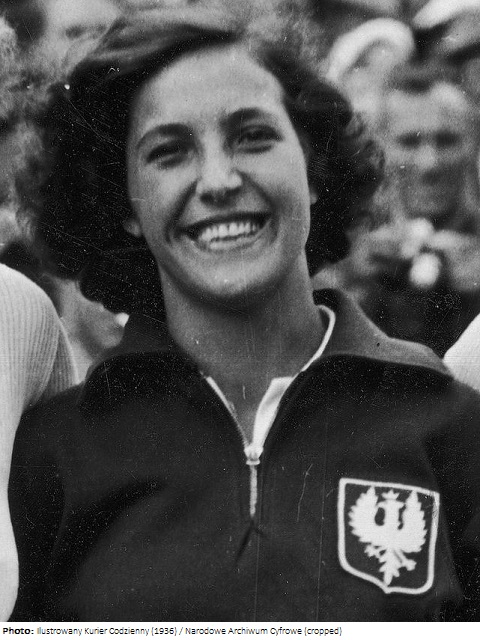
| Roles | Competed in Olympic Games |
|---|---|
| Sex | Female |
| Full name | Maria Jadwiga•Kwaśniewska (-Trytko, -Koźmińska, -Maleszewska) |
| Used name | Maria•Kwaśniewska |
| Born | 15 August 1913 in Łódź, Łódzkie (POL) |
| Died | 17 October 2007 (aged 94 years 2 months 2 days) in Warszawa (Warsaw), Mazowieckie (POL) |
| Measurements | 165 cm / 56 kg |
| Affiliations | AZS Warszawa, Warszawa (POL) |
| NOC |  Poland Poland |
| Medals | OG |
| Gold | 0 |
| Silver | 0 |
| Bronze | 1 |
| Total | 1 |
Maria Kwaśniewska was a Polish athlete and part of the Polish resistance movement during World War II. At the local girls’ grammar school Kwaśniewska played volleyball, basketball, and handball before she began to focus on athletics. In 1930, when Kwaśniewska was 17-years-old, she became the Polish national champion in the long jump. As a specialist in the javelin throw Kwaśniewska represented Poland seven times between 1930 and 1946. Kwaśniewska set nine Polish records in the javelin and was a 14-time national champion in multiple events including the long jump and javelin. Kwaśniewska also represented Poland in volleyball and basketball. At the 1936 Berlin Olympics Kwaśniewska won the bronze medal in the javelin competition with a throw of 41.80. After the event was concluded all three medallists had their photo taken with Adolf Hitler.
In 1937 Kwaśniewska lived in Warszawa and took an active role in the resistance movement. The apartment where she lived became an open house for Poles and Jews who were homeless and starving. When World War II began Kwaśniewska was living in Genova, Italy, but she returned to Warszawa on hearing news of the German invasion of Poland. On reaching the Polish capital Kwaśniewska worked as an ambulance driver, as she had previously become a paramedic, and helped to transport wounded soldiers to hospitals. In August 1944 the Nazis began to establish Dulag 121, a transit camp for the people of Warszawa who had been driven out of their homes. Kwaśniewska went to the camp with the photo of her and Hitler from the 1936 Berlin Olympics. As a result the camp guards did not question Kwaśniewska, who appeared to know the Führer personally. Kwaśniewska was then able to escort multiple prisoners from the camp, saving them from either forced labour or the concentration camps.
After the War was over Kwaśniewska made a brief return to sport, becoming the Polish champion one more time in the javelin and representing Poland in basketball. In her final sporting appearance Kwaśniewska finished sixth in the javelin throw and seventh in the shot put at the 1946 European Championships. From 1947 to 1979 Kwaśniewska sat on the board of the Polish Athletic Association. In Poland she co-founded the Klub Olimpijczyka (Olympians club) and was a member of the Polski Komitet Olimpijski. In 1979 Kwaśniewska became the first Polish athlete to receive the Bronze Olympic Order. She was also bestowed with the Silver Olympic Order in 1999.
Personal Best: JT – 44.03 (1936).
| Games | Discipline (Sport) / Event | NOC / Team | Pos | Medal | As | |
|---|---|---|---|---|---|---|
| 1936 Summer Olympics | Athletics |  POL POL |
Maria Kwaśniewska | |||
| Javelin Throw, Women (Olympic) | 3 | Bronze |